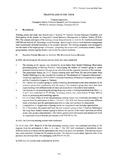| dc.contributor.author | Aswani, Shankar | |
| dc.contributor.author | Christie, Patrick | |
| dc.contributor.author | Muthiga, Nyawira | |
| dc.contributor.author | Mahon, Robin | |
| dc.contributor.author | Primavera, Jurgenne | |
| dc.contributor.author | Cramer, Lori A.z | |
| dc.contributor.author | Barbier, Edward B. | |
| dc.contributor.author | Granek, Elise F. | |
| dc.contributor.author | Kennedy, Chris | |
| dc.contributor.author | Wolanski, Eric | |
| dc.contributor.author | Hacker, Sally | |
| dc.date.accessioned | 2012-06-07T13:12:22Z | |
| dc.date.available | 2012-06-07T13:12:22Z | |
| dc.date.issued | 2012 | |
| dc.identifier.citation | Aswani, S., Christie, P., Muthiga, N. A., Mahon, R., Primavera, J. H., Cramer, L. A., … Hacker, S. (2012). The way forward with ecosystem-based management in tropical contexts: Reconciling with existing management systems. Marine Policy, 36(1), 1-10. | en |
| dc.identifier.issn | 0308-597X | |
| dc.identifier.uri | http://hdl.handle.net/10862/975 | |
| dc.description.abstract | This paper discusses some of the challenges and opportunities that can arise when implementing ecosystem-basedmanagement (EBM) in tropical nations. EBM creates a new series of challenges, problems, and opportunities that must be considered in light of existing governance and management frameworks in a local context. The paper presents five case studies from different parts of the tropical world, including Oceania, insular and continental Southeast Asia, East Africa, and the Caribbean, which illustrate that the implementation of EBM in watershed and marine ecosystems offers a new series of challenges and opportunities for its inclusion with existing forms of environmental governance and management. The paper suggests that EBM is best thought of as an expansion of customary management (CM) and integrated coastal management (ICM), rather than a paradigm shift, and that it has certain benefits that are worth integrating into existing systems when possible. The paper concludes that the cultural and institutional context of CM as well as the experience, technical skills, and legal basis that serve ICM programs are logical platforms from which to build EBM programs. Some guidelines for creating hybrid management regimes are suggested. In sum, declining marine species and ecosystems require urgent action, necessitating utilization of existing paradigms such as ICM and CM as a foundation for building EBM. | en |
| dc.description.sponsorship | This work was conducted by the Measuring Ecological, Economic, and Social Values of Coastal Habitats to Inform Ecosystem-Based Management of Land-Sea Interfaces Working Group and the Governance Feasibility of Marine Ecosystem-Based Management Working Group supported by the National Center for Ecological Analysis and Synthesis, funded by the National Science Foundation (Grant DEB-0553768), the University of California Santa Barbara, the State of California, and the David and Lucile Packard Foundation. | en |
| dc.language.iso | en | en |
| dc.publisher | Elsevier | en |
| dc.subject | Caribbean Sea | en |
| dc.subject | South East Asia | en |
| dc.title | The way forward with ecosystem-based management in tropical contexts: Reconciling with existing management systems | en |
| dc.type | Article | en |
| dc.date.updated | 2012-06-07T12:48:03Z | |
| dc.citation.volume | 36 | |
| dc.citation.issue | 1 | |
| dc.citation.spage | 1 | |
| dc.citation.epage | 10 | |
| dc.citation.journalTitle | Marine Policy | en |
| dc.subject.asfa | coastal zone management | en |
| dc.subject.asfa | hybrids | en |
| dc.subject.asfa | ocean policies | en |
| dc.subject.asfa | offshore structures | en |
| dc.subject.asfa | resource management | en |
| dc.subject.asfa | river basin management | en |
| dc.subject.asfa | tropical climate | en |
| dc.subject.asfa | watersheds | en |
| dc.identifier.doi | 10.1016/j.marpol.2011.02.014 | |



